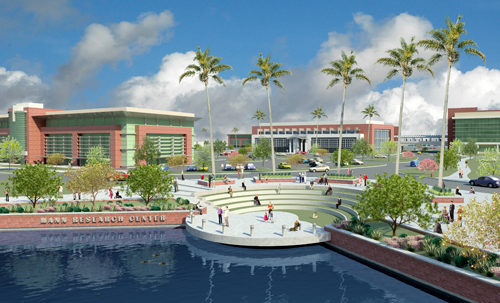Mann hopes to break ground by early 2011 on its Mann Research Center in the Florida Center for Innovation at Tradition, a privately developed research park in Port St. Lucie, Fla.
The Mann Research Center will be a multiple-tenant complex developed on a 22-acre (9-hectare) site in FCI. It will feature 300,000 sq. ft. (27,870 sq. m.) of research and development space in a variety of configurations, including both wet and dry lab facilities. Mann also plans 100,000 sq. ft. (9,290 sq. m.) of medical offices and 10,000 sq. ft. (929 sq. m.) of retail space.
When the company decided it was time to expand, it looked at several states before deciding on Florida.
“When MannKind started looking around the country, we looked at demographics, GDP numbers, talent and university affiliations. We narrowed it to Florida,” says Andy Favata, vice president
Mann Research Center. “Within a short drive from here, we can get to the biggest biotechs in Florida. The cost of living is low and when you add all the corporate advantages, it pretty much hit the mark.”
Favata cites other Port St. Lucie attributes such as the city’s aggressive support of sustainability initiatives, a good public-private partnership and a collaborative business environment — a product of all of the scientific talent moving into the region.
Favata says developer Core Communities started the Tradition development with the idea of creating a place to attract business and create jobs with part of the strategy being allocation of land for a research and development park.
“The vision is to become a premier R&D park that has a very clear focus on conducting life science research and getting that research from the labs to the marketplace,” Favata says. “It started in 2005 and now it is rapidly becoming a cluster in Florida’s emerging life sciences industry.”
Healthier Climes for Discovery
Mann is marketing its planned space to single-use tenants involved in R&D for immunology, medical devices, drug discovery and healthcare.
“We are seeing more interest from established companies that are looking to make a business decision in this economy,” Favata says. “These are companies that maybe feel that they are in locations where they aren’t getting support from the community and where maybe
university partnerships don’t exist. State taxes are going off the charts in some places, and companies are making moves to get out and expand or relocate to a climate that is favorable for business.”
Favata says Mann is targeting companies in West Coast states, especially California, as potential tenants. He cites the recent trend of California companies setting up shop in the Sunshine State.
Favata describes the Mann Research site as being shovel ready, with utilities in the ground and the pad ready to go.
“We can do a deal quickly and the city will make the permit process extremely fast,” he says. “Nothing is built for spec anymore.”
Favata says the plan is to build one building every year for the next four years with a total investment of around $100 million. He estimates that when the complex is fully occupied, 400 to 500 people will work there.
Favata hopes to announce the center’s first tenants by the end of 2010. He anticipates that companies drawn to Mann Research Center may have a focus on immunology.
“The companies we are talking to seem to be focused around cancer vaccines, drug discovery and immunology. The research tends to focus around why a patient’s immune system is failing and to develop products for that. It’s a part of the industry that is growing fast.”
La Jolla, Calif.-based Torrey Pines Institute for Molecular Studies was the first occupant of FCI. The company, which conducts research into a wide variety of major medical conditions including multiple sclerosis, cancer, heart disease, Types 1 and 2 diabetes, pain, inflammation, AIDS and other infectious diseases, transplant rejection and rheumatoid arthritis, opened a 108,000-sq.-ft. (10,033-sq.-m.) facility.
